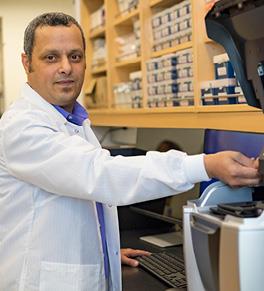UCI team readies universal coronavirus vaccine prototype for human trials

“If this universal vaccine performs as we expect, it could prevent the spread of future coronaviruses by humans and animals,” says Lbachir BenMohamed, who studies eye diseases at the Gavin Herbert Eye Institute. Photo courtesy of the BenMohamed lab.
Scientists with the UCI Health Gavin Herbert Eye Institute have designed a promising vaccine prototype aimed at preventing all coronavirus strains and variants, not just the one that causes COVID-19.
The research team — led by Lbachir BenMohamed, PhD, director of the Laboratory of Cellular and Molecular Immunology and professor with the eye institute — hopes to begin a phase 1 clinical trial of the prototype’s safety by early 2022.
“If this universal vaccine performs as we expect, it could prevent the spread of future coronaviruses by humans and animals,” said BenMohamed, a vaccinologist and immunologist who trained at the Pasteur Institute in Paris. “It would be like the polio or smallpox vaccines that everyone gets.”
The prototype — developed with a $3.7 million grant from the National Institute for Allergy and Infectious Diseases (NIAID) — uses previously unknown human antibodies and cellular proteins called epitopes that the researchers identified in the SARS-CoV-2 virus genome and in other coronaviruses circulating among humans and animals.
BenMohamed said it already has proven effective in animal studies against the California and Washington state variants of SARS-CoV-2. They are now examining its efficacy against the South African and the United Kingdom variants. Soon they will test it on the far more contagious Delta variant, which emerged in India and already accounts for more than 20% of new COVID-19 cases in the United States. Experts are uncertain how effective the current COVID-19 vaccines are against the Delta variant.
A different approach
The Pfizer, Moderna and AstraZeneca COVID-19 vaccines were designed to attack the virus’ infamous spike protein. in addition to the spike protein, BenMohamed’s lab focused on other virus proteins and epitopes that can trigger immune responses. They also studied the virus that caused the first epidemic of Severe Acute Respiratory Syndrome (SARS) in 2003, now called SARS-CoV-1, as well as four of the most common human cold viruses and numerous animal viruses.
In a recent study published in the Journal of Immunology, the UCI team reported finding novel human antibodies and cellular epitopes in more than 81,000 SARS-CoV-2 genomic sequences isolated from COVID-19 patients around the world. They found these same or similar structures in the human cold viruses and the SARS-like viruses from bats, pangolins, civet cats, mink and camels that have been implicated in previous cross-species infections.
Coronaviruses that have spread from animals to humans have caused three major global threats over the last 20 years, SARS-CoV-2 being the most dangerous. It has triggered a pandemic that disrupted nations and economies and killed more than 3.9 million people.
Given that new SARS-like viruses will continue to emerge, the UCI team has been working nonstop for the last 18 months to develop an mRNA vaccine prototype, which could eventually be delivered as a patch, an intranasal spray or a pill taken orally.
"We will select the best, most practical, least costly and easily reproducible methods for delivering the universal pan-coronavirus vaccine," BenMohammed said.
Exploring the virus’ genetic makeup
They began studying the SARS-CoV-2 virus when its genomic sequence was first released in January 2020, using seed money from the eye institute. A $100,000 grant from Emergent Ventures, a program of the Mercatus Center at George Mason University in Virginia, and the NIAID grant from the National Institutes of Health enabled them to delve into the voluminous genomic sequencing data, identify potential immune response targets and begin testing them in their lab.
Once they have completed lab testing on the prototype's effectiveness against the major variants, the next step is to study its effectiveness in humans. BenMohamed estimates that a phase 1 clinical trial would cost as much as $20 million. To raise the funds, he and his collaborators have created TechImmune LLC, a partnership with the university, the eye institute and other investors.
A successful initial clinical trial would be followed by phase 2 and phase 3 trials to prove the vaccine’s safety and efficacy. If all goes well, he believes a pan-coronavirus vaccine could be available by the end of 2023.
“I’m very hopeful that this work will lead to something that can save humanity from another pandemic,” he said. “That would make me very, very happy.”




